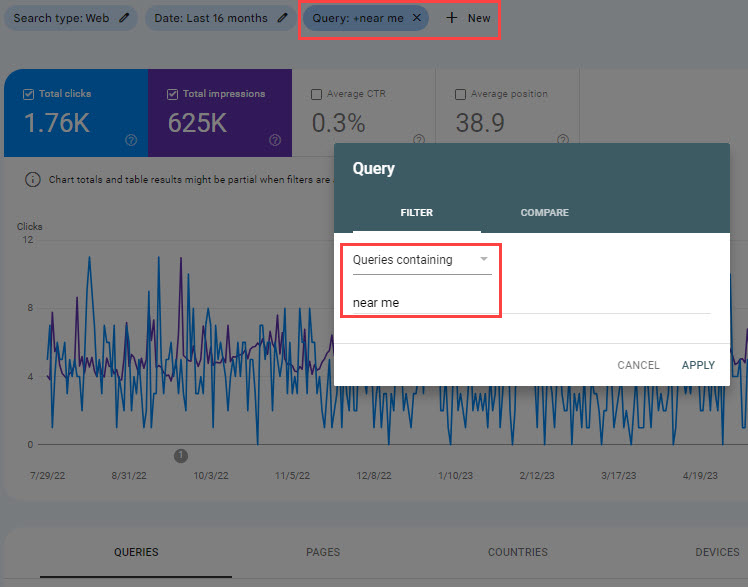What about Google Analytics, and GBP Insights, and third-party rank-trackers? Each of those has its place in the world and can come in handy. You may use them, and they may help. But if you had to pick ONE way to measure how you’re doing in the local search results, one place to monitor progress, one tool to help you troubleshoot, Google Search Console is your best (or least-bad) choice. In my experience, it’s the sturdiest buoy you can cling to.
Whether you do your own local SEO, are part of a team that works on it, or are an SEO professional who needs to put out the occasional fire, here’s why I say Google Search Console (“GSC”) is uniquely helpful to help you figure things out, and why digging around in its data is a uniquely high-payoff use of your time:
1. GSC shows you your search-engine visibility (“impressions”), and not just the traffic that results from that visibility. You can see your impressions and clicks in the “Performance” area in the left-hand sidebar, which is where all the action is, and where I suggest you go whenever you want to know just about anything about your local search visibility.

By contrast, Google Analytics will show you only the clicks you get, and not also how many eyeballs you get (unless you sync GA and GSC). It’s common to have a page on your site that gets little or no traffic, but that ranks pretty well. That kind of page isn’t a lost cause, and it might do well with just a little more work or time. Not having impressions and not having clicks are two different problems, and you don’t want to abandon a page because you think you have both problems when in reality you only have one problem (and soon may be able to fix that, too). Don’t rip up your watermelon patch because it’s been 40 days and you don’t have a watermelon-sized watermelon yet. You may need to give it more nourishment, and you’ll definitely need to give it more time.
2. It’s easy to zero in on specific pages that may be limping along and may need work. Your site doesn’t rank in the organic results for this term or that term; individual pages do. In the Google Maps results, too, specific pages tend to be responsible for your ranking for this term or that term in the local 3-pack. Probably a good 90% of the site optimization and content-creation work you’ll ever do will be on one page at a time, rather than on site-wide elements (e.g. footer links, main nav, XML sitemap, robots.txt, possibly redirects, etc.). With focused data you can focus your work. Check out the “Pages” tab (under “Performance”).

3. You can see what happened on certain days, and you can compare time ranges. In the “Performance” area you can see exactly what happened to specific pages and for specific search terms around the time calls dried up 2 months ago, and around the time business picked up again last Tuesday. Search Console shows you the “when,” allowing you to understand the “what.”
4. You can measure your Google Business Profile (local 3-pack) visibility, too. UTM tracking links show up in Search Console, so it’s easy to distinguish your Google Business Profile visibility and traffic from your organic visibility and traffic. You want to know exactly where your visibility gaps are. So I suggest you create a tracking link and use it as the landing page URL of your Google Business profile. Check out Claire Carlile’s excellent guide on creating tracking links for GBP., along with this handy template for creating them.
![]()
5. The filters. You can find out a TON by using filters to look at different slices of your “Queries” and “Pages” data. For example, you can see all of the pages that rank for search terms that contain the words “near me.” You can see how many people searched for your business by name vs. by typing in broader search terms. If you suspect you were affected by an algorithm update or the arrival of a new competitor on the map, you can filter out all of the impressions and clicks from your GBP page(s), and then you can do similarly for organic search. You can see how all of your “service” pages or “product” pages or “city” pages or blog posts perform as a group. The filters are simple, but incredibly powerful. I suggest you spend a few minutes playing around with them.


6. Secrets and surprises: GSC can tell you what you didn’t know you wanted to know. In “Queries” (under “Performance”) you can see how you perform for terms you didn’t even know you rank for, terms you didn’t know you’d want to rank for, and terms you didn’t think anyone would search for. In most third-party rank-trackers and similar tools you can only see your rankings for terms that you specify and ask the tracker to track. In Search Console it’s easy to see what’s cookin’, even when you’re not in the kitchen.
8. Few of your competitors use GSC. In an exceptionally competitive market, where half of the business owners need to know a thing or two about SEO just so they don’t get totally fleeced by the average agency, maybe half the business owners have evan heard of Search Console. Half of that group have it installed on their sites, half of those people personally have access to it, and half of those people ever pop in to look at the issues that Google sends those annoying notification emails about. Most of that 6% (or so) of business owners never even pop into the “Performance” area of Search Console, let alone have an inkling as to what to do with the information they see in there. So by my rough math, your SEO antennae are in the top 1% if you ever poke your head into GSC to look for answers.
9. GSC doesn’t change often or dramatically. Sure, it has its share of bugs, and Google tinkers with it from time to time. But it doesn’t see the same frequency of facelifts and makeovers that other Google products do.
11. It’s free.
Search Console is far from perfect. It only shows you up to 16 months of data. It gets bedbugs. Some of the data can be unreliable. You always can fill in your data and understanding with what you see in other tools, and maybe you should. But if you need to pick ONE place to see how you’re doing in local search – both organic and Maps – it’s your least-bad choice. It shows you the big picture, it allows you to dig into very specific questions or concerns, and it’s quick and simple for you and others to navigate once you’ve got your sea legs. Search Console intel has been exceptionally useful for my clients and for me, as it will be for you. Dig right in.
What data have you found most helpful in Search Console? Have you ever gleaned insights in there that saved your bacon? Is there anything you haven’t been able to understand or tease out of Search Console? Leave a comment!

Excellent post Phil. We peak at GSC but not nearly enough. That changes today.
Hey, thanks, Michael. Frequent pop-ins are all you need to head off a lot of problems at the pass.